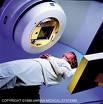
January 21, 2009 - Adding radiation therapy to lumpectomy in the treatment of ductal carcinoma in situ (DCIS) substantially decreases the risk of recurrence of either DCIS or invasive breast cancer in the affected breast, according to a study from Westmead Hospital in Australia and the University of Sydney.
Annabel Goodwin, M.D., the study’s co-author, and colleagues from the Westmead Hospital in Australia and the University of Sydney looked at recent studies that evaluated the addition of radiation therapy after lumpectomy in the treatment of DCIS. They also found that there appear to be no long-term side effects from the radiation, such as damage to the heart or lungs.
"We wanted to assess whether breast conserving surgery followed by radiotherapy is better than breast conserving surgery alone," Goodwin said. "We also wanted to investigate if there was any short- or long-term toxicity from the use of radiotherapy to determine the balance between benefit and harm."
The review appears in the latest issue of The Cochrane Library, a publication of The Cochrane Collaboration, an international organization that evaluates medical research. Systematic reviews draw evidence-based conclusions about medical practice after considering both the content and quality of existing medical trials on a topic.
The researchers identified four high-quality studies that compared breast-conserving surgery with or without radiation therapy in patients with DCIS. The review included data from 3,925 women.
DCIS is different from invasive breast cancer in that abnormal, precancerous cells form within the milk duct of the breast but do not spread to other parts of the breast. If treated, it is usually curable. However, if left untreated, it substantially increases a woman's chance of developing invasive breast cancer.
Women usually cannot feel a lump in the breast with DCIS usually cannot be felt as a lump in the breast, but a mammogram can often detect it. Breast-conserving surgery where only the affected part of the breast is removed followed by radiation, is successful for most.
The reviewers found that the addition of radiation therapy after breast conserving surgery decreases the risk of recurrence of either DCIS or invasive breast cancer in the treated breast by 51 percent.
"This means that for every nine women having breast-conserving surgery [for DCIS], if they all had radiotherapy, one woman would be spared from having a local recurrence of her breast cancer because of the radiotherapy," Goodwin said. She added that the results of two included studies suggested that women over 50 had a greater benefit from the addition of radiotherapy than younger women did.
The researchers found no evidence of increased long-term toxicity from the radiation treatment. "Newer techniques of radiation therapy reduce the dose of radiation to the surrounding normal tissues such as the lungs and heart," Goodwin said. "This is likely to reduce the potential long term side effects, but longer term follow up of patients in these studies is needed to confirm this."
Surgical oncologist and breast cancer expert Monica Morrow, M.D., from the Memorial Sloan-Kettering Cancer Center, said that the review confirms what most physicians currently recommend for their patients with DCIS who opt for breast-conserving treatment. "The best way to minimize the chance of recurrence is with radiation," she said.
Survival rates the percentage of women who are alive after a certain period after diagnosis are excellent for women with DCIS, no matter whether they choose mastectomy or breast-conserving therapy. In patients who have breast-conserving therapy with or without radiation therapy, survival rates range from 90 percent to 99 percent at 10 years.
Doctors overwhelmingly favor breast-conserving therapy for DCIS, Morrow said. However, many women in the U.S. choose more aggressive treatment with mastectomy.
"Studies show that the bigger the patient's role in decision-making, the greater the likelihood the patient will end up with mastectomy," she said. "This is because most patients don't distinguish between DCIS and invasive breast cancer, because a lot of the stuff they find on the Internet is written about invasive cancer."
While it is true that the risk of having a recurrence of breast cancer after a mastectomy is lower than after breast conserving therapy in DCIS, Morrow said there is not much difference in survival rates. "What I tend to emphasize to my patients with DCIS is that no matter which treatment they choose, their risk over the next 15 years of dying of something else is greater than their risk of dying of breast cancer. In the end the difference of survival, if there is any, is on the order of a percent or two."
Goodwin A, et al. Post-operative radiotherapy for ductal carcinoma in situ of the breast. Cochrane Database of Systematic Reviews 2009, Issue 1.
Source: Health Behavior News Service
For more information: www.hbns.org and www.cochrane.org


 August 09, 2024
August 09, 2024 








